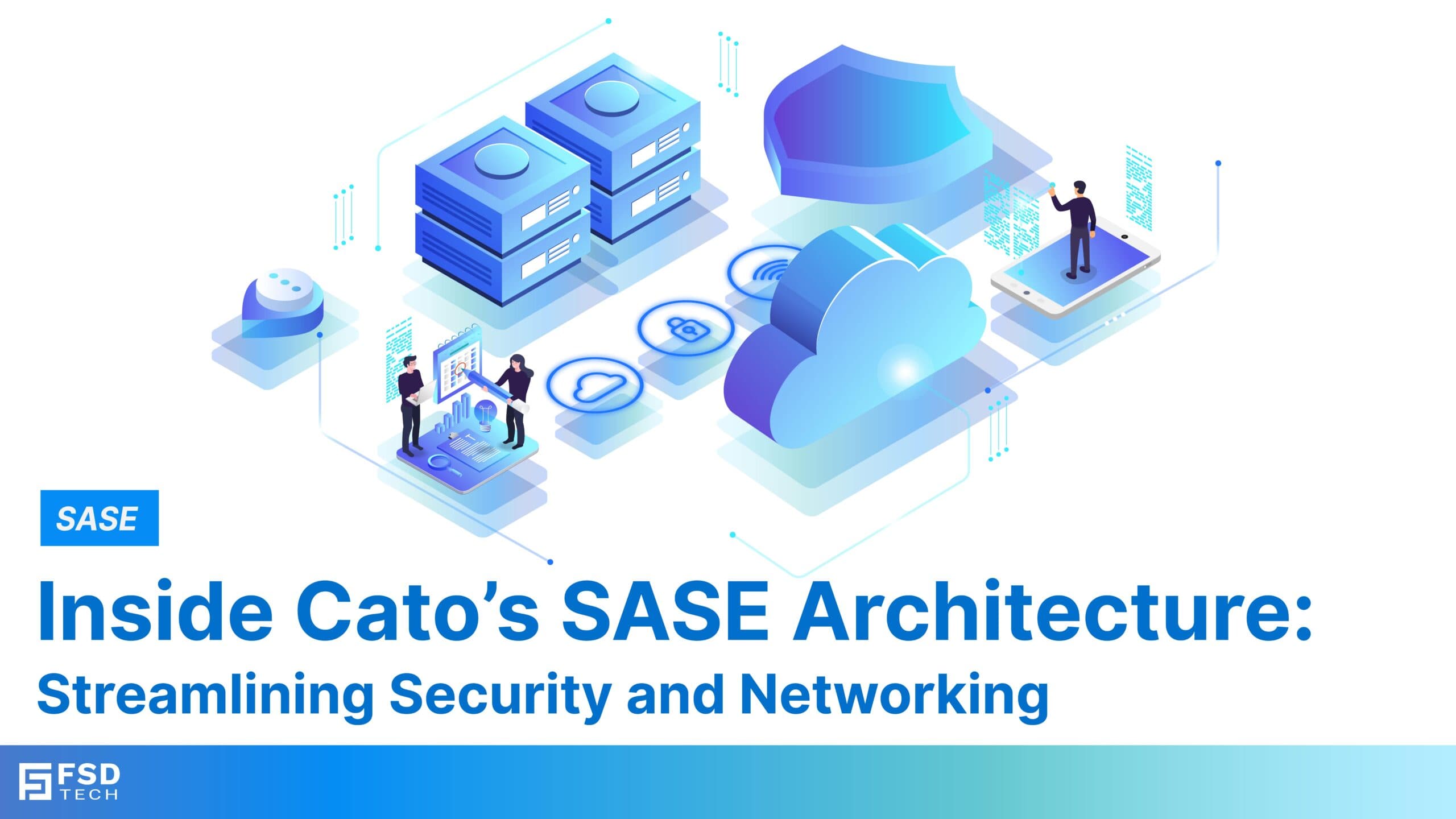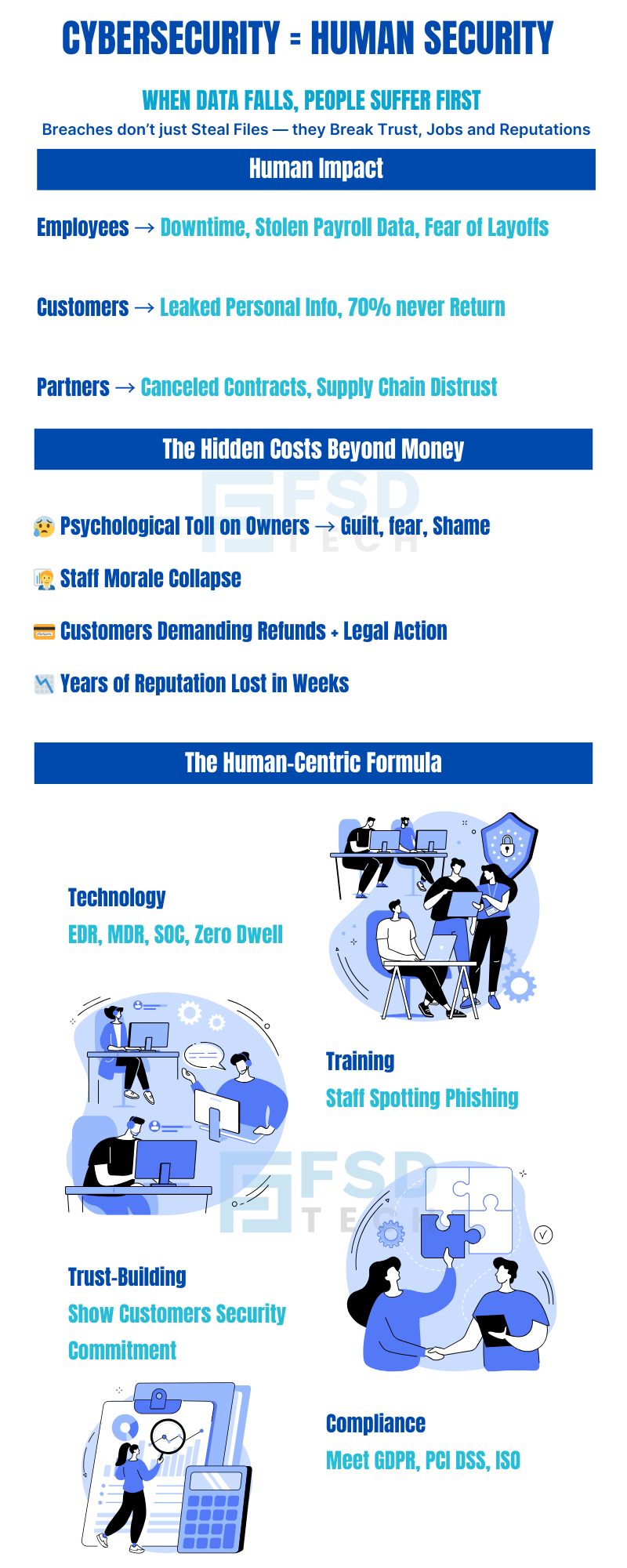
Inside Cato’s SASE Architecture: A Blueprint for Modern Security
🕓 January 26, 2025
%20The%20Human%20Side-01.jpg&w=3840&q=75)
When business owners in GCC & Africa hear the word cybersecurity, their first thoughts are usually about:
For many, it feels like a technical field that only “big companies” with IT departments should worry about.
But here’s the reality → Cybersecurity is not just about technology. It’s about people.
When cybersecurity fails, it’s not just data that’s stolen → it’s trust, livelihoods, and relationships.
And for SMBs in GCC & Africa, where trust drives customer loyalty and growth, the human side of cybersecurity is the most critical aspect to understand.
Let’s imagine Mariam, who runs a healthcare clinic in Nairobi.
Her clinic is a trusted name in the community. Families bring their children for check-ups, elderly patients come for regular care, and professionals rely on her clinic for quick, reliable service.
Everything seems perfect — until one morning, Mariam gets a call:
“The clinic’s patient database has been hacked.”
Confidential medical records, including names, histories, and contact details, have been stolen.
This isn’t just a “cyber incident” — it’s a human crisis.
Patients feel betrayed, staff feel demoralized, and Mariam’s reputation is deeply damaged.
But Mariam decides to act.
She partners with FSD-Tech’s MSSP (Managed Security Services Provider) model, which brings enterprise-grade security to SMBs at affordable rates.
✔ EDR (Endpoint Detection & Response): Every device is secured.
✔ MDR (Managed Detection & Response): A 24/7 monitoring team protects her clinic.
✔ Zero Dwell Containment: Threats are blocked instantly before they cause harm.
✔ SOC Reports: Regulators receive compliance documentation to restore trust.
Slowly, Mariam’s clinic recovers. Patients return, knowing their data is safe again.
This story highlights the true essence of cybersecurity → protecting people’s trust as much as business data.
When SMBs suffer a cyberattack, most headlines talk about the financial losses.
Yes, they’re big — $50,000 to $200,000 on average for SMBs in GCC & Africa.
But beyond the numbers, here are the human consequences that hit harder:
One cyberattack can undo years of relationship-building in days.
Not sure how a cyber incident could impact your employees and customers? Fill out the form and our team will contact you with a personalized risk assessment for your SMB.
For many SMB owners, a cyberattack feels personal.
This psychological toll can be as damaging as the financial impact.
That’s why SMBs need to start viewing cybersecurity as emotional protection for their business family — employees, customers, and partners.
Cybersecurity is often sold as a “technology investment,” but in reality, it’s a human investment.
Here’s why:
Omar runs a chain of retail stores in Dubai.
One day, hackers breach his payment system and steal customer credit card data.
The result?
Omar feels crushed. Years of reputation vanish overnight.
Then he turns to FSD-Tech.
✔ EDR protects every device across stores.
✔ MDR ensures every transaction is monitored 24/7.
✔ Zero Dwell stops malware instantly.
✔ SOC reports rebuild confidence with banks and partners.
Omar not only restores trust but also grows stronger than before.
Today, he proudly displays “Secured by FSD-Tech” badges in all stores.
Customers feel reassured → sales bounce back.
This shows that cybersecurity isn’t just a defense.
It’s a tool to rebuild human trust.
To protect both profits and people, SMBs need a balanced formula:
Together, this formula creates a 360° shield around employees, customers, and partners.
Many SMBs still think:
“Cybersecurity is just for big companies.”
But here’s the risk of ignoring the human side:
In GCC & Africa, where community trust and word-of-mouth drive business, this can destroy SMBs faster than financial loss.
FSD-Tech offers a human-focused cybersecurity approach designed for SMBs:
With FSD-Tech, SMBs don’t just buy tools → they buy peace of mind, trust, and long-term growth.
At the end of the day, cybersecurity is not only about defending against hackers.
It’s about protecting lives, jobs, and relationships.
For SMBs in GCC & Africa, cybersecurity = human security.
Book your Human-Centric Cybersecurity Assessment with FSD-Tech today — and protect what truly matters. Book Now

It means cybersecurity is not just about firewalls and software. It’s about protecting people — your employees, customers, and business partners. A cyberattack can hurt people’s trust, expose personal data, and even cause job losses.
In GCC & Africa, trust drives business growth. Customers return to businesses they trust. Employees perform better when they feel secure. A single data breach can break that trust instantly and drive people away.
Cyberattacks create stress and confusion for employees. They may lose work time during downtime, worry about their personal data being stolen, or even fear losing their jobs if the company suffers heavy losses.
Customers expect businesses to protect their data. If customer details are leaked, they may lose trust forever. Studies show 70% of customers stop doing business with a company after a breach.
Partners and suppliers depend on your business’s reliability. If you suffer a breach, they may hesitate to share information or even cancel contracts. A lack of cybersecurity can mean lost growth opportunities.
In GCC & Africa, many SMBs grow through word-of-mouth and community trust. If that trust breaks, it can destroy years of reputation. Cybersecurity protects trust by showing customers and partners that their data is safe.
Yes. Most cyberattacks start with human error — like clicking on phishing emails. Training employees helps them spot fake messages and avoid mistakes. This makes staff your first line of defense.
No. Antivirus is outdated and cannot stop modern threats like ransomware. SMBs need EDR (endpoint protection), MDR (24/7 monitoring), SOC (compliance reports), and Zero Dwell containment to keep data safe.
By showing that customer data is secure. With tools like encryption, SOC reports, and FSD-Tech’s Zero With FSD-Tech’s MSSP services, SMBs in GCC & Africa can achieve compliance and unlock new contracts.
Compliance (ISO 27001, PCI DSS, GDPR, HIPAA) is about protecting people’s sensitive data. Meeting compliance requirements shows regulators, partners, and customers that your SMB takes data protection seriously.
Yes. Large companies and governments only work with partners who follow strong security standards.
When a business is hacked, downtime and financial losses can lead to layoffs. By investing in cybersecurity, SMBs protect profits and keep staff safe from sudden job insecurity.
Zero Dwell is advanced technology that blocks threats instantly before they spread. This means customer data, employee records, and partner information remain safe — no waiting, no damage.
Dwell containment, SMBs can assure customers that their data will never be exposed. Trust = loyalty.
Yes. FSD-Tech’s MSSP model makes cybersecurity affordable by offering enterprise-level protection at a monthly subscription cost. SMBs don’t need big IT budgets — they can start small and scale as needed.
The first step is a Human-Centric Cybersecurity Assessment. FSD-Tech helps SMBs:
This ensures people and profits are protected together.

Anas is an Expert in Network and Security Infrastructure, With over seven years of industry experience, holding certifications Including CCIE- Enterprise, PCNSE, Cato SASE Expert, and Atera Certified Master. Anas provides his valuable insights and expertise to readers.
Share it with friends!
share your thoughts